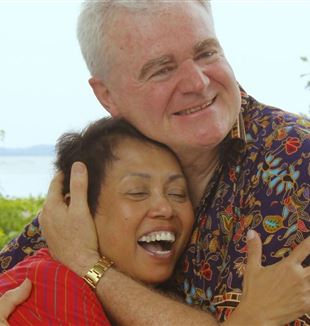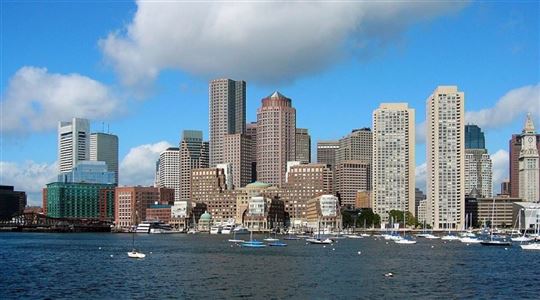
USA: With their heart upon their sleeve
Alpha comes from an island in the Philippines. Her irreducible search for meaning has led her to rediscover "the beauty of depending" and led her to an encounter that changed her life, and Maurizio’s...This is the story of a little girl who grew up on an island in the middle of the ocean. But Alpha Paradela’s story is also the “the story of each of us”. She was born in 1965 in the Philippines, in the Visayan islands, where there was no electricity and people lived off what what was caught in the morning. Since she was a child, she has learnt to depend "on others, on nature, on God. A storm would come and take everything away. We had nothing, but I was happy.”
The Catholic faith was as familiar to her as climbing up palm trees. She awoke in the morning to her grandparent reciting the Rosary and, at sunset, would go to the elderly people of the island, who sat in front of the houses, to ask them to bless her on the forehead. Faith was her parents’ way of life: "I looked at them, day after day, I saw how they treated people". Her father, a lawyer, defended the dissidents of the Marcos regime and people from the slum; her mother, a doctor, specialized in tuberculosis in order to help the poor.
She was sent to study in Cebu City, where her religious education continued in a Catholic school. In her final year of high school, she decided to volunteer in a hospital. There, one morning, she saw a naked boy, with his hands tied, accompanied by his parents: "He was schizophrenic. That was the moment when I decided to become a psychiatrist.” And she did so brilliantly, at a time where the Philippine population was 100 million, and there were 200 psychiatrists scattered over 7,000 islands: "The work was very interesting, we had to be innovative in order to reach as many people as possible, even in the most remote places".She developed a method that led her, at the age of thirty-two, to become a teacher. She was sent to different countries by the World Health Organization, until she was hired, as a manager, by a pharmaceutical company. She had a career, a son whom she adored, and she travelled the world. "I had everything I wanted. And I always knew it wasn't enough.”
Shortly afterwards, she decided to leave the company and a job that many people would dream about. But every morning, from her penthouse office in the heart of the financial district, she would look down and see the poor on the street, and she felt that that was her place. Taking the bus, she smelt the "scent" of the people: "I belong to them", she thought. The turning point came during a vacation in the United States. She decided to take her son, David, to DisneyWorld with her mother. While there, she thought about the umpteenth business trip that awaited her, to Singapore, and she felt the pressure of increasingly clear questions: What would happen if I no longer had anything? If I were no one? At the end of the vacation, she said to her mother: “You go home. We will stay in America.” On the phone, her father only asked her one thing: “What are you running away from?”. “I’m not running away; I am running towards something. I don’t know what, but I’m going towards something”.
The first problem, getting a visa. She asked for help from a fellow psychiatrist, which she had met sometime before, who helped her without asking for anything in return. Thus she found herself in Boston, with a son and little money: it's 2004, she's forty years old and has made the firm decision to live without anything, for the pressing urgency to experience need, to depend. An urgency to be true. To then return to her people in the Philippines. This was the plan.
"Mom, why do people come to the United States to become rich whilst we’ve come to become poor?” She didn’t even back down in the face of her son’s question, while they lived in a basement, and she was surprised how he, a little boy, put all his effort into school to get scholarships. There were many great difficulties, yet the anxiety dwindled: "I began to understand that having nothing meant paying attention to the need for meaning that I had.”
In 2007, she was diagnosed with lung cancer. The doctor optimistically gave her a prognosis of two years. “In that moment I said to God, “Now you have brought me to my knees. What can I give You if not life?"”. She lost her job and her hair fell out because of the chemotherapy, but "I was sure that He would listen to me, give me something.” She found a job in a nursing home, where she acted as a clown to entertain the old people. "I was happy to make others happy.” There, she met Bill, a ninety-year-old man in a wheelchair, who confided to her: "I only have one wish, to die in the arms of someone who loves me". She looked at him, "Bill, let's run away!". She took him to live with her and David, for five months, fulfils all his wishes, from hamburgers to trips to the beach and mountains. Bill died at home with them, in her arms: "For me it was a gift," says Alpha: "The way God taught me more about life.”
To welcome Bill, she and her son had moved an hour and a half away from Boston. "There was a reason that we ended up there. And it wasn't just for Bill.” In that town, she began to attend the Church of the Blessed Sacrament. There, shortly after the death of her friend, in the notices, she found an advert for “School of Community”. She didn’t know what it is, but she turned the flyer over and, on the back, was an article by Julián Carrón on the theme of hope. "As soon as I read it, I exploded: "Why did it take You so long to give me this?!". I found what I was looking for.”
How was she so sure? “The surprise”, she says: “It’s the surprise itself. Something that is happening. In the midst of my routine, going to Mass on Sunday, automatically praying to God, without even knowing anymore if He was real, and with all my need for meaning, I read that article and it was Him who said to me: "I am always here"". This is why she immediately went to the School of Community and, there, she met Anujeet, a Sikh that had converted to Catholicism, and, through him, she met Jessica and Matt, and others...
"At the first Spiritual Exercises I said: "I don't know why, but since I’ve got to know you, my life is so beautiful. It's a new way of knowing, of living.”” It's hard for her to contain what she saw in them; she says that they wore their heart upon their sleeve: "They weren't afraid to show it. They were enlightened by the desire and love for Jesus. Through them, I had found myself. And I could return to the Philippines with peace.”
Only one year remained before her visa expired, just as David was finishing high school, and she didn't stand still: among the parish notices she found an advert looking for a nanny. And thus her destiny met that of Maurizio. "The most critical moment of my life was the best," she says today, referring to when they met. Born in Ivrea, Maurizio Cattaneo emigrated to Canada, with his family, in 1976. There, he began years of intense work and study, washing dishes and studying chemical engineering in Toronto. He entered into the difficult American system and got a job in experimental research. During his doctorate in Montreal, he met Marie France, who became his wife, and in 1997 they moved to the USA. In 2010, she died suddenly from an infection. And he found himself raising his children alone, Françoise, 12 years old, and Christian, 9 years old.
"God was not present in my life. I didn't know how to pray, I had no experience of how to turn to Him. My wife and I had not had a religious upbringing, so neither did our children, and when she died, the dearest thing to me, I found myself with a great void". His work weighed him down and he didn't know how to move on; a friend suggested that he put an advert in the parish newspaper to find someone to help him at home. Then came Alpha’s phone call.
The first time they met, Maurizio gave her keys to his house and car. "I knew immediately that she was the right person.” One evening, the children ask her to stay for dinner and they saw her pray before eating: "What are you doing?". "I’m thanking God for this food.” “Why?! Dad gave us the food!” The same thing happened before going to bed. They don't understand, they laugh, they think she's crazy, but Maurizio intervenes: "From this moment on, do whatever Alpha tells you". He’s fascinated by this woman, and she will be the one to introduce him, despite his reservations, to friends from CL: "Even there everything happened instantaneously, as had happened with Alpha”, he says: "Something simultaneously immediate and deep. It was the encounter. The first person I met was Lorenzo. He listened to me, he had great tenderness towards me, he didn't judge: that young man had something unknown to me, he had something I wanted". He was used to hear people say: "You think like a computer", but these friends "saw who I am".
Once her visa had expired, Alpha had decided to return to the Philippines, but her cancer was advancing, she had to start an experimental therapy. And, more importantly, Maurizio had asked her to become his wife. They would marry on 27 August, 2011.
Today, while they speak to us on Skype from their home in Boston, they spoon-feed Elizabeth, an elderly woman with Alzheimer's, as if she were their daughter: "When her husband was dying, we promised her that we would take her with us". Their days are like this, overflowing with gratuitousness, back and forth from "Casa Monte Cassino", the service that Alpha now directs and that takes in sick children. They look after little ones, their families, and other cancer patients like her: "When one of them dies, the relatives ask me: why are you still alive? She challenges me a lot. And every time I think: my day will come. This helps me to be aware of the time I have been given, to make my present more meaningful.” Then she adds: "Despite everything that's happened to me... I keep forgetting. I do not live off the memory of Jesus. How many times do I say "no" to him? But He always prepares something for me, more than I can imagine. And the only thing I have to say is "yes".”
Why is your story, which is so unique, everyone’s story? "I come from an island where I learnt to depend. We all depend. When we grow up, we all think it’s better to be autonomous. But the need does not go away. Our heart's need, which is the need of the other and of a meaning. We put it aside but it does not disappear. We all seeking. And we can all return to depend, to be happy.”